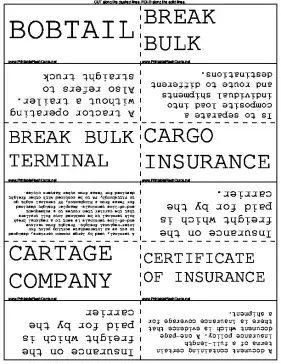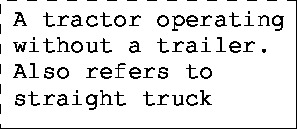

Carrier, shipment, and trucking lingo is used in these career flash cards.
There are 65 flash cards in this set (11 pages to print.)
To use:
1. Print out the cards.
2. Cut along the dashed lines.
3. Fold along the solid lines.
Sample flash cards in this set:




| Questions | Answers |
|---|---|
| BOBTAIL | A tractor operating without a trailer. Also refers to straight truck |
| BREAK BULK | Is to separate a composite load into individual shipments and route to different destinations. |
| BREAK BULK TERMINAL | A terminal, used by large common carriers, designed to act as an intermediate sorting point for inter-regional freight. Freight from various end-of-line terminals is sent to a regional break bulk terminal to be combined into full trailers that the carrier then routes to a subsequent end-of-line terminals. Example: freight destined for Texas from a Binghamton, NY terminal might go to Pittsburgh, PA to be combined with other freight destined for Texas from other Eastern cities. |
| CARGO INSURANCE | Insurance on the freight which is paid for by the carrier. |
| CARTAGE COMPANY | Insurance on the freight which is paid for by the carrier |
| CERTIFICATE OF INSURANCE | A document containing certain terms of a full-length insurance policy. A one-page document which is evidence that there is insurance coverage for a shipment. |
| COMMON CARRIER | Freight transportation company which serves the general public. May be regular route service (over designated highways on a regular basis) or irregular route (between various points on an unscheduled basis). |
| CONNECTING CARRIER | A carrier which interchanges trailers with another for completion of shipments. |
| CONTRACT CARRIER | - Company that transports freight under contract with one or a limited number of shippers. |
| CROSS-DOCKING | Operations in a warehouse which involves moving goods between different trucks to consolidate loads without intermediate storage. |
| DEAD-HEADING | Operating a truck without cargo or the freight loaded on the trailer does not generate any revenue. |
| DETENTION TIME | A charge the motor carrier assesses when a shipper or receiver holds a truck or trailer beyond the free time the carrier allows for loading or unloading. |
| DISPATCHING | The scheduling and control of truck pickup and delivery. Critical link in dispatching process is communication with driver which may be accomplished by phone, pager, radio, satellite communication, and cellular phone. |
| DOMESTIC INTERCITY TRUCKING | Trucking operations which carry freight in their local areas and commercial zones. |
| DOUBLE DROP | A flatbed trailer (stepdeck) whose deck drops at the rear, ahead of the tires as well as at the front of the trailer, but deeper than a single drop. This puts the deck closer to the ground than a single drop as the deck drops below the top of the tires. |
| DRAYAGE FIRMS | Motor carriers that provide local pickup and delivery of trailers and containers (on chassis). |
| DRY VAN | A van that doesn't have a reefer unit |
| END-OF-LINE TERMINAL | A terminal used for pick-up and delivery of freight. Freight collected is sorted and routed to other end-of-line terminals or break bulk terminals for eventual delivery. Freight received from other terminals is sorted and allocated to drivers for delivery |
| FLATBED / FLATDECK | A truck with a flat deck made of wood or metal for carrying cargo. |
| FLOW-THROUGH DISTRIBUTION | A process where goods from multiple locations are brought into a central point, re-sorted by delivery destination and shipped in the same day. Typically involving a combination of TL and LTL carrier resources, this practice eliminates warehousing, reduces inventory levels and speeds order turnaround time. |
| FOR-HIRE CARRIER | A company that provides truck transportation of cargo belonging to others and is paid for doing so. There are two types of for-hire carriers: common carriers and contract carriers. A for-hire carrier may be both a common and a contract carrier, but must file separate registrations to obtain both licenses. |
| FREIGHT CARRIER | A freight carrier refers to those companies that haul freight, also called "for-hire" carriers. Methods of transportation that freight carriers use include trucking, railroads, airlines, and sea borne shipping. |
| FREIGHT FORWARDER | An independent business which handles export shipments for compensation. At the request of the shipper, the freight forwarder makes the actual arrangements and provides the necessary services for expediting the shipment to its overseas destination. The forwarder takes care of all documentation needed to move the shipment from origin to destination, making up and assembling the necessary documentation for submission to the bank in the exporter's name. The forwarder arranges for cargo insurance, makes the necessary overseas communications, and advises the shipper on overseas requirements of marking and labeling. The forwarder operates on a fee basis paid by the exporter. |
| FUEL SURCHARGE | An adjustment based on a rounded average of the national U.S. on-highway average prices for a gallon of diesel fuel. |
| GENERAL FREIGHT CARRIER | A carrier which handles a wide variety of commodities in standard trailers. Such carriers can provide truckload or less-than-truckload service |
| HOT SHOT | An emergency shipment of goods that are needed in a hurry |
| INTERLINE FREIGHT | Freight which moves from point of origin to destination over the lines of two or more transportation companies. |
| INTERMODAL TRANSPORTATION | Transportation movement involving more than one mode, e.g. rail-motor, motor-air, or rail-water. |
| KINGPIN | A kingpin is an anchor pin at the center of a semi trailer's upper coupler which is captured by the locking jaws of a tractor's fifth wheel to attach the tractor to the semi trailer. |
| LTL CARRIER | LTL carriers are trucking companies that consolidate less-than-truckload cargo for multiple destinations on one vehicle. LTL carriers are carriers which specialize in shipments under 10,000 pounds. |
| LOGBOOK | Book carried by truck drivers in which they record their hours of service and duty status for each 24-hour period. |
| LUMPER | A lumper is a person who assists a motor carrier owner-operator in the loading and unloading of property; lumping is quite commonly used in the food industry. Often there is a fee placed on the driver for this assistance. |
| MOTOR CARRIER | A motor carrier refers to an individual, partnership, or a corporation that is engaged in the transportation of goods. A motor carrier is an enterprise that offers service via motor carriage (truck). |
| NATIONAL MOTOR FREIGHT CLASSIFICATION | The National Motor Freight Classification (N.M.F.C.) is a pricing tool that provides a comparison of commodities moving in interstate and intrastate transport. Based on an evaluation of density, stowability, ease of handling and liability, the commodities are grouped into one of 18 classes. The N.M.F.C. provides both carriers and shippers with a standard by which to begin pricing negotiations and greatly simplifies the comparative evaluation of the many thousands of products moving in today's marketplace. This pricing system is used predominantly by large common carriers. |
| PER HUNDRED WEIGHT | Per Hundred Weight (CWT) is a unit of weight measurement created by U.S. merchants since the late 1800s. A hundred weight is equal to exactly 100 pounds. Usually, this measurement is used by large common carriers in rating charges for freight. |
| PIGGYBACK | The transportation of highway trailers or removable trailer bodies on rail cars specifically equipped for the service. It is essentially a joint carrier movement in which the motor carrier forms a pickup and delivery operations to a rail terminal, as well as a delivery operation at the terminating rail head. |
| POWER UNITS | The control and pulling vehicle for trailers or semi trailers |
| PRIVATE CARRIER | A company which maintains its own trucks to transport its own freight |
| PROOF OF DELIVERY (P.O.D.) | Is information supplied by the carrier containing the name of the person who signed for the shipment, the time and date of delivery, and other shipment delivery related information. |
| PUP TRAILER | Short semi trailer usually between 26 and 32 feet long with a single axle. |
| RATE | The charge for transporting freight |
| REFRIGERATED CARRIER | A refrigerated carrier refers to a trucking company that specializes in moving temperature sensitive freight. Refrigerated carriers utilize vans that have controlled temperature reefer units on their trailers to keep specialized products at a constant temperature. Food items and pharmaceuticals are common products that are shipped by refrigerated carriers. |
| SEAL | Device that is serially numbered and used to temporarily fasten trailer and truck doors so that unauthorized entry into the unit can be detected. |
| SHIPPER | The party which tenders goods for transportation. |
| SHIPPER'S AGENT | Company which coordinates all aspects of an intermodal move, hiring drayage at both ends, and providing shippers with a single invoice. |
| SHORTAGE | The number of pieces in a shipment are less that the piece count shown on the movement document. |
| STEPDECK / SINGLE DROP | A trailer that has a main deck that is lower than the deck above the fifth wheel, but not as low as that of a double drop. The back of the deck is usually level with the top of the trailer tires. |
| STRAIGHT TRUCK | A vehicle with the cargo body and tractor mounted on the same chassis. |
| SURCHARGE | A charge above the usual or customary charge. |
| TARE WEIGHT | Weight of the empty truck, without occupants or load. |
| TARIFF | A tax assessed by a government on goods entering or leaving a country. The term is also used in transportation in reference to the fees and rules applied by a carrier for its services. |
| TARP / TARPAULIN | A water resistant fabric cover used to protect the cargo on an open trailer |
| TEAM | Team of two drivers who alternate driving and resting, resulting in a faster transit of goods. |
| TERMINAL | A building for the handling and temporary storage of freight pending transfer between locations. |
| THIRD PARTY LOGISTICS PROVIDER | Company which coordinates all aspects of an intermodal move, hiring drayage at both ends, and providing shippers with a single invoice. |
| TIME-DEFINITE SERVICES | Delivery is guaranteed on a specific day or at a certain time of the day. |
| T.O.N.U | Truck Order Not Used. |
| TRACKING AND TRACING | Monitoring and recording shipment movements from origin to destination. |
| TRACTOR TRAILER | Power unit and semi trailer combination. |
| TRANSIT TIME | The total time that elapses between a shipment's pickup and delivery, including breaks and rest periods taken by the driver |
| TRANSPORTATION BROKER | A transportation broker refers to a non-asset based company which sells & manages freight transportation services on behalf of their clients. Transportation brokers play an important role in the trucking industry managing very large volumes of truckload & less than truckload shipments. Transportation brokers typically arrange and manage, on behalf of their clients, the entire transportation process of a freight shipment. Their service includes finding a qualified carrier (with the proper insurance and operating authorities) who can move the freight in a timely manner, negotiating a good rate and then managing the entire process from pickup through to delivery. Also referred to as freight agent , freight broker , trucking broker and load broker. |
| TRUCKLOAD CARRIER | Trucking company which dedicates trailers to a single shipper's cargo, as opposed to an LTL (Less Than Truckload) carrier which transports the consolidated cargo of several shippers and makes multiple deliveries. |
| VAN (DRY VAN) | Standard trailer or truck with all sides enclosed. |
| WAYBILL | A waybill is a description of goods with a carrier freight shipment. |
| YARD TRACTOR | Special tractor used to move trailers around a terminal, warehouse, distribution center, etc. (Also referred to as a yard mule). Does not typically leave the yard where it is stationed. |